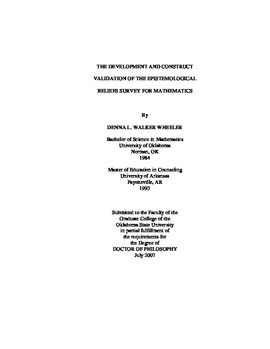| dc.contributor.advisor | Barnes, Laura L. B. | |
| dc.contributor.author | Wheeler, Denna L. | |
| dc.date.accessioned | 2013-11-26T08:35:01Z | |
| dc.date.available | 2013-11-26T08:35:01Z | |
| dc.date.issued | 2007-07 | |
| dc.identifier.uri | https://hdl.handle.net/11244/7625 | |
| dc.description.abstract | Scope and Method of Study: | |
| dc.description.abstract | Item level factor analysis of the EBSM indicated that the data was best characterized by a hierarchical factor structure. Scores on seven uni-dimensional scales, representing hypothesized dimensions of the EBSM, were factor analyzed. The result was a single factor representing beliefs about mathematics and math learning. The internal consistency reliability estimate for the resulting 39 item scale was .93. The construct validity of the EBSM was evaluated through a series of regression analyses. | |
| dc.description.abstract | Findings and Conclusions: | |
| dc.description.abstract | The EBSM scores were regressed onto math related variables including mathematics experience, attitudes toward mathematics, and responses to math-based learning scenarios. Statistically significant relationships were documented. Analysis of mean differences based on demographic variables was conducted and both gender and age seemed to be generally unrelated to epistemological beliefs while academic classification had a small, but statistically significant relationship with beliefs. Mean differences based on academic major were analyzed using both ANOVA and MANOVA. Results indicate that differences exist between students majoring in hard and soft domains but no differences were found between pure and applied domains. The Real World Applicability and Innate-General subscales appeared to be primarily responsible for the observed mean differences. In addition, EBSM scores were regressed onto the subscales of a general measure of epistemological beliefs, a measure of achievement goals, and a measure of implicit theories of intelligence. Results indicate that the EBSM was related to theories of intelligence and general epistemological beliefs but unrelated to achievement goals. | |
| dc.format | application/pdf | |
| dc.language | en_US | |
| dc.rights | Copyright is held by the author who has granted the Oklahoma State University Library the non-exclusive right to share this material in its institutional repository. Contact Digital Library Services at lib-dls@okstate.edu or 405-744-9161 for the permission policy on the use, reproduction or distribution of this material. | |
| dc.title | Development and construct validation of the epistemological beliefs survey for mathematics | |
| dc.contributor.committeeMember | Fuqua, Dale R. | |
| dc.contributor.committeeMember | Perry, Katye M. | |
| dc.contributor.committeeMember | Montgomery, Diane | |
| osu.filename | Wheeler_okstate_0664D_2326.pdf | |
| osu.accesstype | Open Access | |
| dc.type.genre | Dissertation | |
| dc.type.material | Text | |
| dc.subject.keywords | personal epistemology | |
| dc.subject.keywords | mathematics education | |
| dc.subject.keywords | math beliefs | |
| dc.subject.keywords | scale development | |
| thesis.degree.discipline | Educational Psychology | |
| thesis.degree.grantor | Oklahoma State University | |
